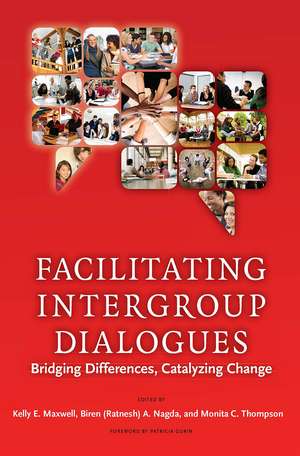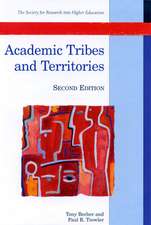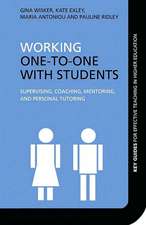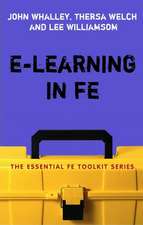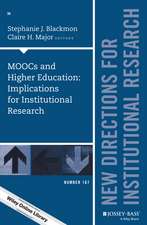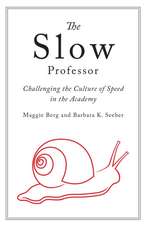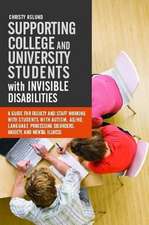Facilitating Intergroup Dialogues: Bridging Differences, Catalyzing Change: An ACPA Co-Publication
Autor Kelly E. Maxwell, Biren Ratnesh Nagda, Monita C. Thompsonen Limba Engleză Paperback – 8 feb 2011
| Toate formatele și edițiile | Preț | Express |
|---|---|---|
| Paperback (1) | 305.67 lei 6-8 săpt. | |
| Taylor & Francis – 8 feb 2011 | 305.67 lei 6-8 săpt. | |
| Hardback (1) | 1002.18 lei 6-8 săpt. | |
| Taylor & Francis – feb 2011 | 1002.18 lei 6-8 săpt. |
Din seria An ACPA Co-Publication
- 5%
 Preț: 252.12 lei
Preț: 252.12 lei - 5%
 Preț: 233.04 lei
Preț: 233.04 lei -
 Preț: 412.31 lei
Preț: 412.31 lei -
 Preț: 178.14 lei
Preț: 178.14 lei -
 Preț: 274.83 lei
Preț: 274.83 lei - 5%
 Preț: 262.27 lei
Preț: 262.27 lei -
 Preț: 276.63 lei
Preț: 276.63 lei - 5%
 Preț: 1154.29 lei
Preț: 1154.29 lei - 5%
 Preț: 264.25 lei
Preț: 264.25 lei - 18%
 Preț: 1005.17 lei
Preț: 1005.17 lei - 18%
 Preț: 998.40 lei
Preț: 998.40 lei - 5%
 Preț: 301.72 lei
Preț: 301.72 lei - 18%
 Preț: 998.21 lei
Preț: 998.21 lei - 5%
 Preț: 332.43 lei
Preț: 332.43 lei - 5%
 Preț: 245.69 lei
Preț: 245.69 lei - 15%
 Preț: 206.86 lei
Preț: 206.86 lei
Preț: 305.67 lei
Nou
Puncte Express: 459
Preț estimativ în valută:
58.49€ • 61.15$ • 49.43£
58.49€ • 61.15$ • 49.43£
Carte tipărită la comandă
Livrare economică 06-20 martie
Preluare comenzi: 021 569.72.76
Specificații
ISBN-13: 9781579222918
ISBN-10: 1579222919
Pagini: 288
Dimensiuni: 152 x 229 x 20 mm
Greutate: 0.36 kg
Ediția:New.
Editura: Taylor & Francis
Colecția Routledge
Seria An ACPA Co-Publication
Locul publicării:Oxford, United Kingdom
ISBN-10: 1579222919
Pagini: 288
Dimensiuni: 152 x 229 x 20 mm
Greutate: 0.36 kg
Ediția:New.
Editura: Taylor & Francis
Colecția Routledge
Seria An ACPA Co-Publication
Locul publicării:Oxford, United Kingdom
Public țintă
Postgraduate and Professional Practice & DevelopmentCuprins
Foreword—Patricia Gurin 1. Deepening the Layers of Understanding and Connection. A Critical-Dialogic Approach to Facilitating Intergroup Dialogues—Biren (Ratnesh. A. Nagda and Kelly E. Maxwell 2. In the Hands of Facilitators - Student Experiences in Dialogue and Implications for Facilitator Training—Anna M. Yeakley SECTION ONE. Intergroup Dialogue Facilitation. Training for Classroom-based Experiences 3. Training Peer Facilitators as Social Justice Educators. Integrating Cognitive and Affective Learning—Kelly E. Maxwell, Roger B. Fisher, Monita C. Thompson, and Charles Behling 4. Facilitator Training in Diverse, Progressive Residential Communities. Occidental College as a Case Study—Jaclyn Rodríguez, Andrea Rodríguez-Scheel, Shaquanda Lindsey, and Ariel Kirkland 5. Preparing Critically Reflective Intergroup Dialogue Facilitators. A Pedagogical Model and Illustrative Example—Ximena Zúñiga, Tanya Kachwaha, Keri DeJong, and Romina Pacheco 6. (Re)Training Ourselves. Professionals Who Facilitate Intergroup Dialogue—Kathleen (Wong. Lau, Joycelyn Landrum-Brown, and Thomas E. Walker SECTION TWO. Intergroup Dialogue Facilitation Training for Applications to Campus and Community Settings 7. Training Students to Change Their Own Campus Culture Through Sustained Dialogue—Priya Parker, Teddy Nemeroff, and Christina Kelleher 8. Democracy Lab. Online Facilitation Training for Dialogic Teaching and Learning—James T. Knauer 9. Intergroup Dialogue Facilitation for Youth Empowerment and Community Change—Roger B. Fisher and Barry N. Checkoway 10. Extending Intergroup Dialogue Facilitation to Multicultural Social Work Practice—Michael S. Spencer, David J. Martineau, and naomi m. warren SECTION THREE. Learning From and With Intergroup Dialogue Facilitators. Voices on Identity, Alliances, and Career Commitments 11. Identity Matters. Facilitators’ Struggles and Empowered Use of Social Identities in Intergroup Dialogue—Kelly E. Maxwell, Mark Chesler, and Biren (Ratnesh. A. Nagda 12. Not FOR Others, But WITH Others, For ALL of Us. Weaving Relationships, Co-Creating Spaces of Justice—Biren (Ratnesh. A. Nagda, Norma Timbang, Nichola G. Fulmer, and Thai Hung V. Tran 13. Changing Facilitators, Facilitating Change:The Lives of Intergroup Dialogue Facilitators Post-College—Carolyn Vasques-Scalera
Notă biografică
Kelly E. Maxwell is Co-Director, The Program on Intergroup Relations, University of Michigan. Biren Ratnesh Nagda is Associate Professor of Social Work and Director, Intergroup Dialogue, Education & Action (IDEA) Center, at the University of Washington Monita C. Thompson is Co-Director, The Program on Intergroup Relations, University of Michigan. Patricia Gurin is Nancy Cantor Distinguished University Professor Emerita of Psychology and Women's Studies, University of Michigan
Recenzii
"Facilitators and facilitator trainers in higher education are the primary audience of this book. It would be highly useful, however for anyone dealing with diversity in classroom and community groups because of the values, intergroup dynamics, and educational processes it invokes. Even if one did not embark on a fully developed dialogue program, the book and its cited literature comprise an inspiring and useful resource that emphasizes critical awareness and commitment to acting for social justice."
Mary Ann Zimmer, Marywood University
Teaching Theology & Religion
"This valuable volume focuses on an aspect of intergroup dialogue that is rarely discussed in depth: the experiences of facilitators, who are often undergraduate students. The book incorporates guidelines for facilitator training with rich examples of facilitation challenges and consequences, including long-term outcomes for the facilitators themselves. Drawing on an array of models for dialogue on campus and in the community, contributing authors offer important resources particularly for those doing facilitator training on campuses, but also for anyone interested in this important pedagogical strategy."
Diversity and Democracy
“This is an invaluable resource for college administrators and faculty. As today’s elected leaders and media shout past one another, our next generation needs to learn how to talk and work together across our political and social differences to address critical global concerns. This scholarly book provides the research and necessary practical, hands-on experience of how to facilitate constructive intergroup dialogues with students from different backgrounds."
David Schoem, Director, Michigan Community Scholars Program, University of Michigan; Co-Editor of Intergroup Dialogue: Deliberative Democracy in School, College, Community and Workplace
“This volume is a panoramic yet intimate examination of the value of intergroup dialogues and the training of the facilitators in many settings. It incorporates the best research and theory with anecdotal and eloquent accounts from participants, both faculty members and students. From survey research and personal experience, the authors explore the habits of mind and interpersonal skills needed to facilitate intergroup dialogue successfully in the cause of both education and justice. A must-read."
Nancy Cantor, Chancellor of Syracuse University
“This book is a treasure trove of theory, research, and personal narratives of both successes and challenges. Anyone interested in developing an intergroup dialogue program, or using the intergroup dialogue method in other courses, campus organizations, research labs, or other educational settings composed of people from diverse backgrounds will find this book their most important resource. So, too, will practitioners who work with diverse groups of people in communities and in state, national, and international organizations.”
Patricia Gurin, Nancy Cantor Distinguished University Professor Emerita of Psychology and Women's Studies, University of Michigan
Mary Ann Zimmer, Marywood University
Teaching Theology & Religion
"This valuable volume focuses on an aspect of intergroup dialogue that is rarely discussed in depth: the experiences of facilitators, who are often undergraduate students. The book incorporates guidelines for facilitator training with rich examples of facilitation challenges and consequences, including long-term outcomes for the facilitators themselves. Drawing on an array of models for dialogue on campus and in the community, contributing authors offer important resources particularly for those doing facilitator training on campuses, but also for anyone interested in this important pedagogical strategy."
Diversity and Democracy
“This is an invaluable resource for college administrators and faculty. As today’s elected leaders and media shout past one another, our next generation needs to learn how to talk and work together across our political and social differences to address critical global concerns. This scholarly book provides the research and necessary practical, hands-on experience of how to facilitate constructive intergroup dialogues with students from different backgrounds."
David Schoem, Director, Michigan Community Scholars Program, University of Michigan; Co-Editor of Intergroup Dialogue: Deliberative Democracy in School, College, Community and Workplace
“This volume is a panoramic yet intimate examination of the value of intergroup dialogues and the training of the facilitators in many settings. It incorporates the best research and theory with anecdotal and eloquent accounts from participants, both faculty members and students. From survey research and personal experience, the authors explore the habits of mind and interpersonal skills needed to facilitate intergroup dialogue successfully in the cause of both education and justice. A must-read."
Nancy Cantor, Chancellor of Syracuse University
“This book is a treasure trove of theory, research, and personal narratives of both successes and challenges. Anyone interested in developing an intergroup dialogue program, or using the intergroup dialogue method in other courses, campus organizations, research labs, or other educational settings composed of people from diverse backgrounds will find this book their most important resource. So, too, will practitioners who work with diverse groups of people in communities and in state, national, and international organizations.”
Patricia Gurin, Nancy Cantor Distinguished University Professor Emerita of Psychology and Women's Studies, University of Michigan
Descriere
Co-published with Intergroup dialogue has emerged as an effective educational and community building method to bring together members of diverse social and cultural groups to engage in learning together so that they may work collectively and individually to promote greater diversity, equality and justice.
